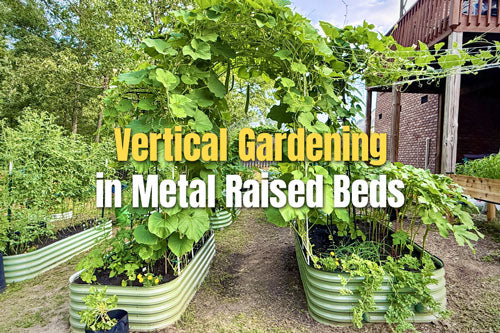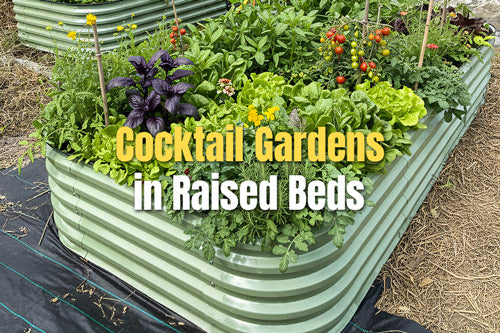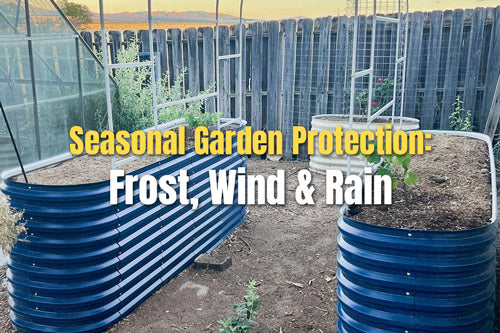The Art of Hügelkultur Gardening: A Step-by-Step Guide to Building a Sustainable Metal Raised Garden Bed
By David
Author bio: David is a blogger and an aficionado in anything related to plants, trees, and gardening. He spends his time writing about digital content for his blog on rebelsjourney.com. On the side, his hobbies include learning and writing about personal development, entrepreneurship, marketing, reading, teaching, and helping provide value whenever he can with his online writing and posts.
Hugelkultur gardening is a centuries-old method of creating raised garden beds that originates in Germany. This technique involves layering organic material and soil to form a hill or mound, providing a fertile growing environment for your beautiful plants to grow.
Hügelkultur (pronounced "hew-gul-culture") is a German word meaning "hill mound" or "hill culture." It's an ancient, permaculture technique in which decaying wooden material—such as logs, branches, and wood chips—is buried under layers of soil, compost, and vegetation.

As the wood decomposes over time, it generates heat and releases nutrients into the surrounding soil. The result is a rich humus layer, filled with microorganisms that support healthy plant growth.
This post will provide a detailed step-by-step guide to building a sustainable and productive Hugelkultur garden bed using metal as the primary construction material. My hope is that you get some good information from this and maybe even start constructing your own Hügelkultur garden.
Why Choose Metal Raised Garden Beds?
Metal raised garden beds offer numerous advantages over traditional wooden beds. Some of these benefits include:
- Durability - Metal beds are resistant to rotting, insects, and weather damage. Plus, they last for many years when compared to wooden beds.
- Heat retention - Metal beds can help retain heat in the soil, promoting faster growth for plants.
- Customization - Metal beds come in various shapes, sizes, and colors, allowing for a high degree of personalization to your garden design.
- Environmentally friendly - By using metal beds, instead of wooden beds, you are helping to reduce deforestation and promote a more sustainable gardening practice.
Pro tip: If you are worried that the bed will hurt the plants in summer, you can choose light-colored metal raised beds with better heat dissipation. Also read: Wooden Raised garden beds Vs Metal raised garden beds.
A Guide to Building a Hugelkultur Garden with Metal Raised Beds
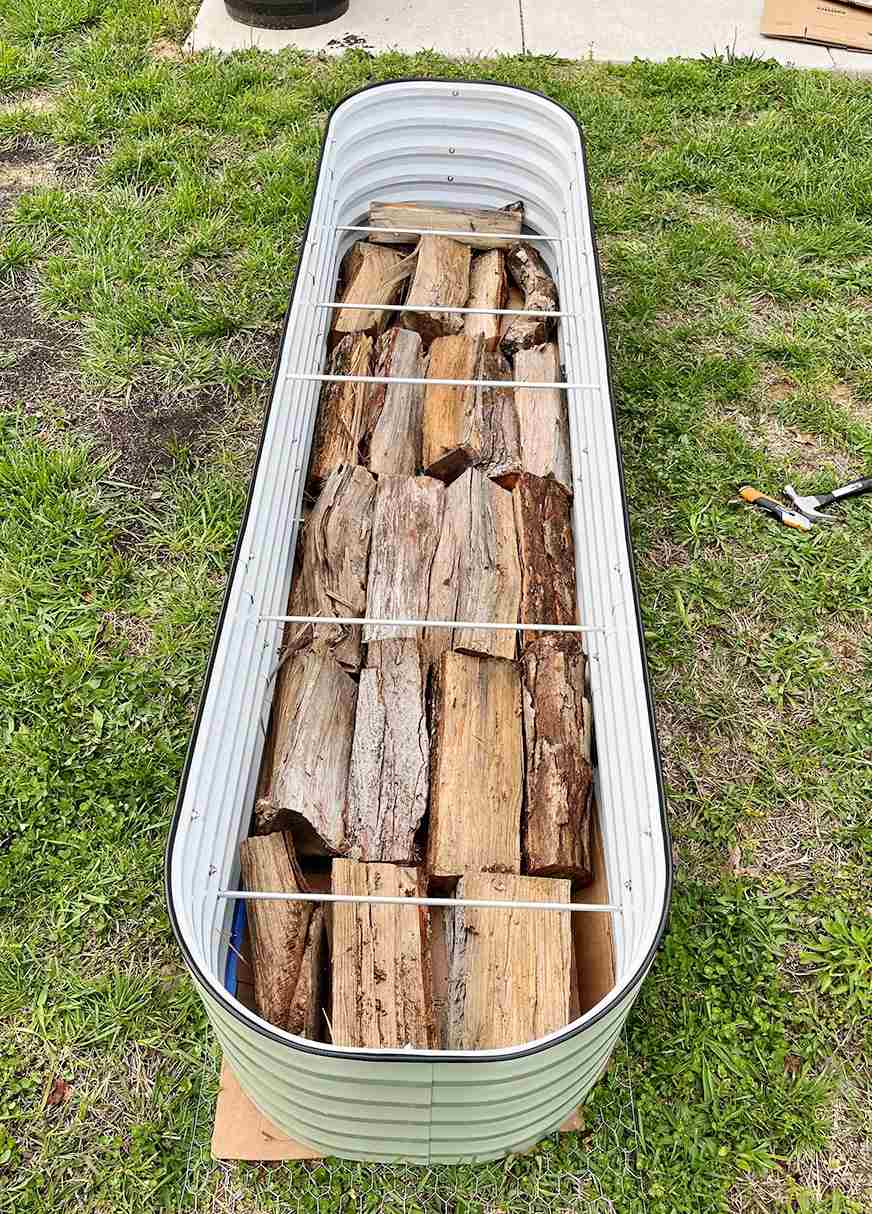
Step 1: Choose the Location and Size of Your Raised Bed
Before making your Hugelkultur garden bed, use the following factors as a guideline to select your location:
- Sunlight - Make sure your garden bed receives adequate sunlight (6-8 hours per day) for optimal plant growth.
- Drainage - Choose a well-draining area to prevent waterlogging and root rot.
- Accessibility - Be sure the location is easily accessible for planting, watering, and harvesting.
- Soil quality - The existing soil should be nutrient-rich and free from contaminants.
Once you've chosen the location, determine the size and shape of your metal raised bed. Common dimensions for raised beds are 4x8 feet, 4x12 feet, or 4x16 feet, but you can customize the size to fit your garden space.
Step 2: Prepare the Site
To prepare the site for your Hugelkultur garden bed, check for the following:
- Clear any vegetation from the area where you plan to build the bed.
- Loosen the soil with a garden fork or rototiller to improve drainage and aeration.
- Create a level surface by removing or adding soil as needed.
- Mark the perimeter of your metal raised bed using string and wooden stakes.
Did You Know? Hügelkultur garden beds can help improve poor-quality soil by introducing organic matter and nutrients through the decomposition process.
Step 3: Assemble and Install the Metal Raised Bed
Assemble your metal raised garden bed according to the manufacturer's instructions. Once assembled, place the bed on the prepared site and secure it in place using metal stakes or brackets, if necessary.
Learn how to assemble Vegega metal raised garden beds here
Step 4: Create the Hugelkultur Layers
Now it's time to build the Hügelkultur layers for your metal raised bed:
- Woody Layer: Fill the bottom of the bed with logs, branches, and twigs. This layer should be about 1-2 feet thick and will help improve aeration and drainage.
- Green Material Layer: Add a 6-inch layer of green materials, such as grass clippings, kitchen scraps, and garden waste, to provide essential nutrients for your plants.
- Compost Layer: Add a 4-inch layer of well-aged compost to add beneficial microorganisms and further enrich the soil.
- Soil Layer: Finally, add a 6-8 inch layer of high-quality garden soil to provide a suitable growing space for your beautiful plants.
Tip: If your raised bed is taller than 2-3 feet, you can repeat the green material, compost, and soil layers until you reach the desired height.
Step 5: Water the Hugelkultur Bed
Thoroughly water your Hügelkultur bed to help layers settle and initiate the decomposition process. Make sure the soil is moist but not waterlogged, as excess moisture can lead to root rot and fungal issues.
Did You Know? Hügelkultur garden beds are known for their water-retaining capabilities, which means you'll need to water them less frequently when compared with traditional raised beds.
Step 6: Plant Your Garden
Now that your Hügelkultur garden bed is ready, it's time to plant your desired fruits, vegetables, or flowers. Follow these general planting guidelines:
- Space plants according to their specific needs to prevent overcrowding and competition for resources.
- Plant taller plants on the northern side of the bed and shorter plants on the southern side to maximize sunlight exposure.
- Use good, pairing planting principles to promote a healthy and diverse garden ecosystem.
Step 7: Mulch and Maintain Your Garden Bed
To help conserve moisture, suppress weeds, and regulate soil temperature, add a 2-4 inch layer of organic mulch, such as wood chips, straw, or shredded leaves, around your plants.
Once you have completed these steps, you should be well on your way to starting a gorgeous garden bed using a tried and true gardening technique.
Remember to regularly water, fertilize, and prune your plants as needed to ensure a productive and thriving Hugelkultur garden bed.
Advantages of Hugelkultur Gardening with Metal Raised Beds
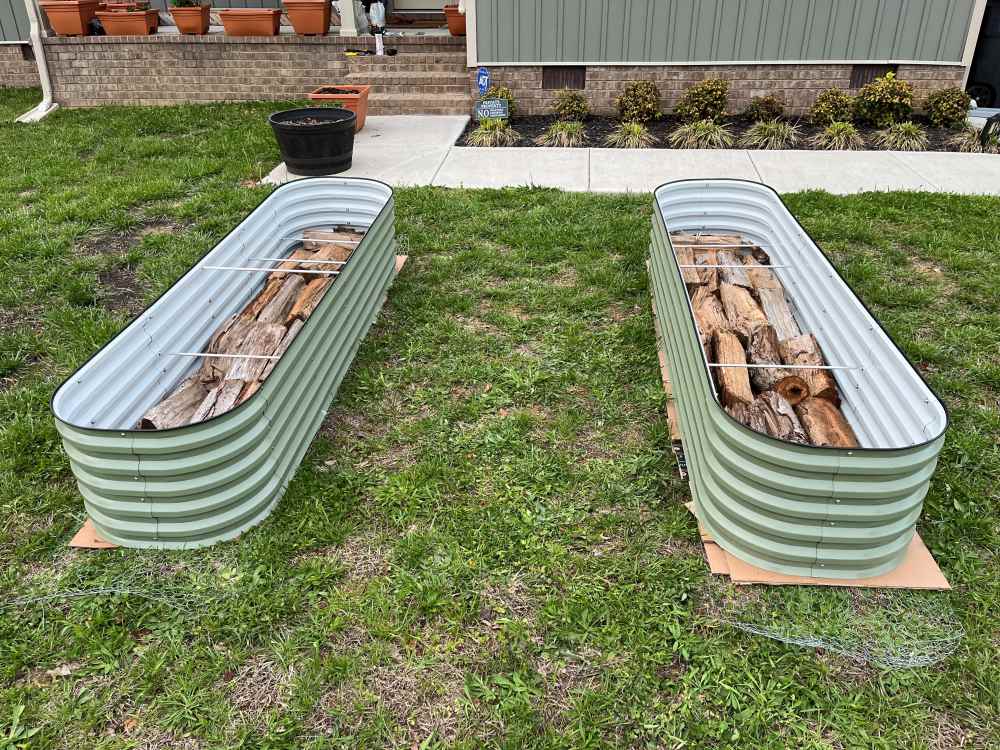
Hugelkultur gardening with metal raised beds offers numerous benefits, including, but not limited to:
- Improved Drainage: The raised bed design promotes better water drainage, reducing the risk of root rot and other moisture-related issues.
- Increased Fertility: Decomposing organic materials releases nutrients into the soil, creating a fertile environment for excellent plant growth.
- Reduced Watering: Needs Hügelkultur beds retain moisture more efficiently and effectively, reducing the need for constant and frequent watering.
- Extended Growing Season: The decomposition process generates heat, warming the soil and allowing for earlier planting and longer growing seasons.
- Sustainability: By utilizing organic waste materials, Hügelkultur gardening promotes a sustainable approach to gardening, compared to other types of gardening.
Conclusion
I hope this post has been useful for your planting and gardening needs. As someone who’s had lots of experience with tree services in Rochester, NY and also someone who’s passionate about tree care, planting and gardening, I wanted to share some of my gardening techniques, so that others can also grow amazing trees and gardens in their homes.
So in conclusion, Hügelkultur gardening with metal raised beds combines the advantages of traditional raised beds with the sustainability and productivity of Hügelkultur practices. By following the step-by-step guide provided in this post, you'll be well on your way to creating a flourishing and eco-friendly garden that provides bountiful harvests for years to come! Read more details about how to build a hugelkultur raised bed.
